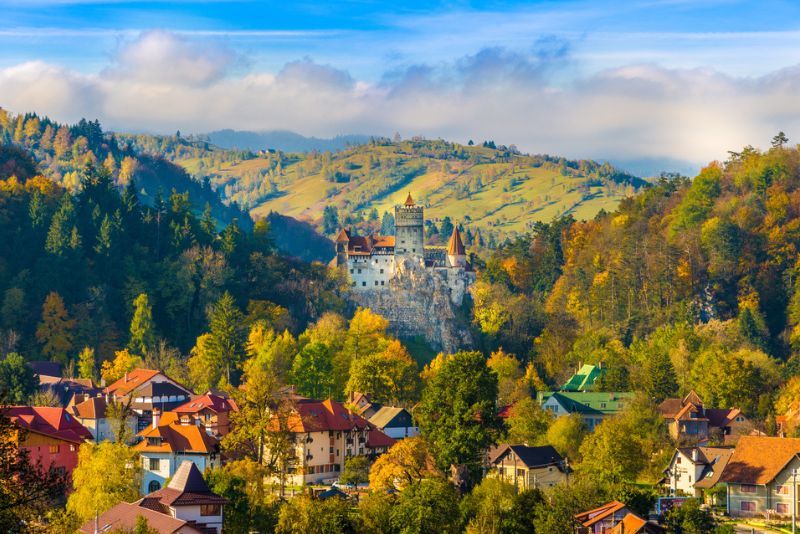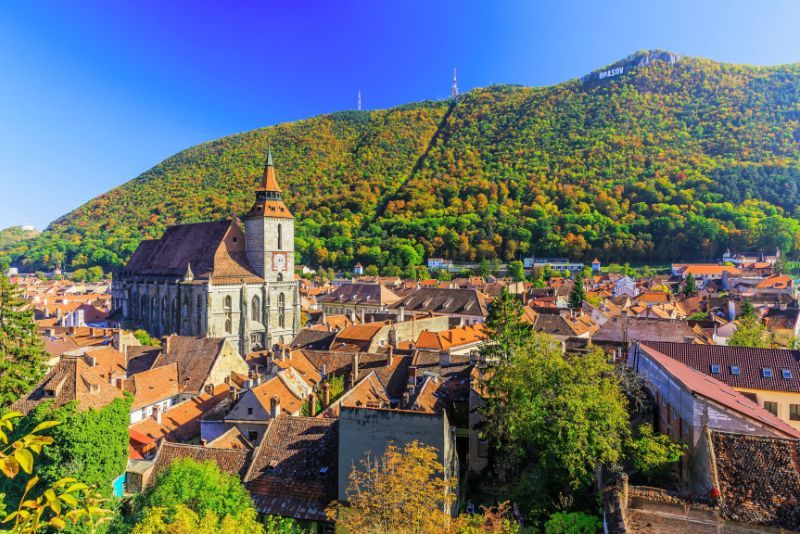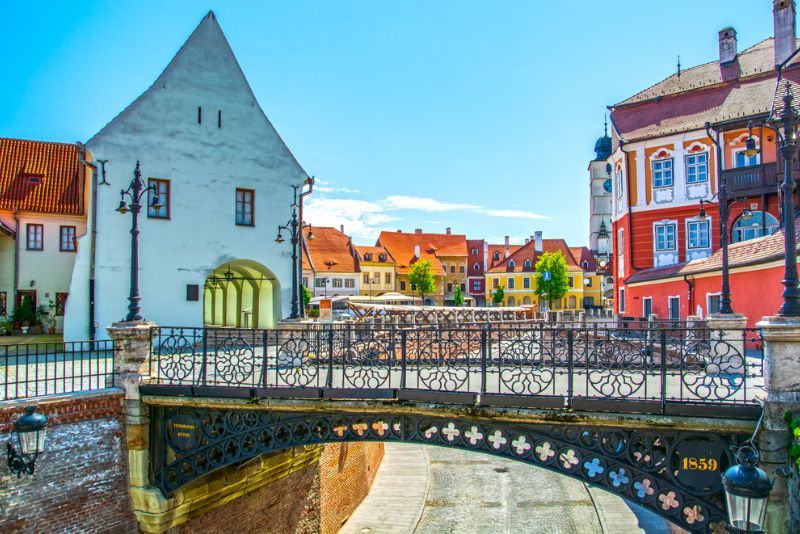Transylvania: Day Trips and Tours from Cluj-Napoca
Often regarded as one of the most haunted spots in Europe for its association with the infamous vampire, “Dracula,” Transylvania is filled with architectural wonders, charming villages and a myriad of opulent castles.
Day trips to Transylvania from Cluj-Napoca are a must for anyone who finds themselves in this part of Romania, with plenty to keep every traveler interested. Embark on a day trip to see several of the region’s attractions, or engage in a multi-day experience and party with the vampires yourself on a spooktacular excursion.
Often regarded as one of the most haunted spots in Europe for its association with the infamous vampire, “Dracula,” Transylvania is filled with architectural wonders, charming villages and a myriad of opulent castles.
Day trips to Transylvania from Cluj-Napoca are a must for anyone who finds themselves in this part of Romania, with plenty to keep every traveler interested. Embark on a day trip to see several of the region’s attractions, or engage in a multi-day experience and party with the vampires yourself on a spooktacular excursion.

(0/24) checking Musement...
Often regarded as one of the most haunted spots in Europe for its association with the infamous vampire, “Dracula,” Transylvania is filled with architectural wonders, charming villages and a myriad of opulent castles.
Day trips to Transylvania from Cluj-Napoca are a must for anyone who finds themselves in this part of Romania, with plenty to keep every traveler interested. Embark on a day trip to see several of the region’s attractions, or engage in a multi-day experience and party with the vampires yourself on a spooktacular excursion.

Here's all you need to know about Transylvania, one of the most exciting day trips from Cluj-Napoca.
How to get to Transylvania from Cluj-Napoca?
Transylvania is a region of Central Romania. It is located approximately 200 kilometers southeast of the city of Cluj-Napoca.
From Cluj-Napoca to Transylvania by car
The journey to Transylvania by car takes approximately 3.5 hours and begins by heading out of the city in a southerly direction along the E81. You’ll then merge onto the A3, switching to the E60 around Acățari. As you approach Transylvania, you’ll utilize Route 133.
From Cluj-Napoca to Transylvania by public transport
Those without access to a car can instead make the jaunt to Transylvania via the reliable public transport network. Both buses and trains connect Cluj-Napoca with the town of Band in Mureș County in just over 4 hours, and operate several times per day. From there, you can travel around the area via local buses.
Guided tour to Transylvania from Cluj-Napoca
Alternatively, many travelers choose to participate in a guided excursion to Transylvania and let someone else take care of the transportation details. These generally last between 10 and 12 hours, although there are also multi-day trips from Cluj-Napoca on offer. Your adventure will usually start between 8 AM and 10 AM, and you’ll visit many places in Transylvania with a guide by your side.
What is the typical itinerary?

While each Transylvania day tour is unique, all excursions share similarities. After meeting your friendly guide, you’ll set off with your group on your adventure. Along the way, you’ll be introduced to the whole area, discover Saxon architecture, hear tales of Dracula and wander the cobbled alleys of enchanting medieval towns.
Destinations on Transylvania day trips can vary, but they usually include Mediaş, Biertan and Sighișoara. You may also get to visit a gypsy community, the likes of which have been settling in these lands for many centuries. Many excursions head back to Cluj-Napoca after a full day of sightseeing.
On multi-day trips to Transylvania, you can expect the itinerary to look a little different. While you’ll still visit many of the above destinations, you’ll typically take a slower approach, allowing plenty of time to discover the highlights of each location. You’ll also engage in evening festivities and rest in a comfortable hotel overnight.
What kinds of tours are available to go to Transylvania?
Guided tours to Transylvania from Cluj-Napoca
The most popular type of day trip to Transylvania operates in small groups and hops between several iconic destinations in the region. You’ll travel to Mediaş and its Citadel of Light before moving on to Biertan to discover its Saxon church, which is fortified and forms part of a UNESCO World Heritage Site.
You’ll also head to Sighișoara — the only inhabited medieval fortress in the southeast region of Europe. Here, you can stroll through its well-preserved Old Town where you’ll find a myriad of towers, along with a torture chamber, and learn about Romania’s historic practices. Before returning to Cluj-Napoca, you’ll visit with a gypsy community, where you can learn more about their lifestyle.
3-Day Halloween tour to Transylvania from Cluj-Napoca
Those who are looking for a different way to spend the spooky season can embark on a multi-day tour to Transylvania and learn the dark secrets behind the region.
The itinerary of this small group excursion is packed full of Halloween activities, such as a party in the Sighișoara Citadel, during which you’ll enjoy a traditional Romanian feast, as well as local tipples. Get involved with the games on offer, which dive into all things eerie, such as vampires and witches.
On day 2, you’ll discover Bran, which is associated with Dracula, the main character of the well-known Bram Stoker novel, as well as Brașov, which is home to a black church, the color of which is the result of a 17th-century fire. Under cover of darkness, head out for another party in the “Dracula Castle” until the early hours before returning to Cluj-Napoca the following day.
Halloween tours to Transylvania only operate toward the end of October and are ideal for anyone visiting Romania during this period.
How much does a day trip to Transylvania from Cluj-Napoca cost?
A day trip to Transylvania typically costs around US$120 per person. These excursions include admission to the fortified church at Biertan, round-trip transportation and the services of a professional guide.
For a multi-day tour of Transylvania, expect to pay US$750 per person, which includes three-star accommodation, some meals, the services of a guide and two Halloween parties.
What will you see and do?

Transylvania has gained a reputation as a haunted destination filled with vampires, thanks to Bram Stoker's classic novel, “Dracula,” from 1897. The tale was inspired by the merciless prince of Wallachia, Vlad the Impaler, who, despite his horrific practices, is considered by many to be a hero for protecting the lands against Ottoman forces.
In reality, the region of Transylvania is filled with enchanting castles and medieval towns. However, its history with vampires extends further back, such as the folk tales of “Strigoi” - people who appeared normal during the day but would leave their bodies at night to haunt the neighborhoods.
One of the most beloved attractions in Transylvania is Bran Castle, which was originally built as a fortress in the 13th century and served as a prison for Vlad the Impaler. The castle has gained notoriety as “the home of Dracula,” matching the description of the vampire’s lair in the novel, despite Stoker having never visited the region.
Other popular landmarks on day trips to Transylvania include the Black Church, which is Romania’s largest Gothic religious monument, as well as the Sighișoara Citadel, which was built in the 13th century to protect the city against invaders.
When is the best time to visit Transylvania?

The best time to visit Transylvania is during late spring (May) and early autumn (September and October). These months offer mild temperatures, fewer tourists, and the landscape is especially picturesque with blooming flowers or autumnal colors. Summer (June to August) is also popular, but can be crowded. For a unique experience with traditional festivals or exploring Dracula lore, consider visiting around Halloween.
Are there any tours to Transylvania from other cities in Romania?
Yes, there are tours departing from other cities in Romania:
Travel tips
- Begin early to maximize your time, as Transylvania has many attractions spread out over the region.
- Many of Transylvania's attractions, like castles and fortresses, involve uphill walks or cobblestone paths, so comfortable shoes are essential. If you're visiting any churches or castles, wear respectful attire.
- Along the way, try traditional dishes like mămăligă (polenta), mămăliguță cu brânză și smântână (polenta with cheese and cream), or mămăliguță cu tocăniță (polenta with stew).

